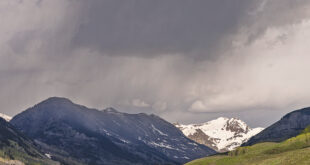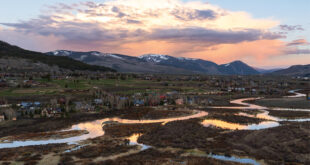The day after the election, I did something I’ve never done following a U.S. election: I cried. I don’t cry easily, but after proofing that week’s paper, I did so the whole way to Crested Butte South and for a good 45 minutes after I got home.
I’m aware that exasperates some citizens, particularly those who believe it’s time to be a patriot and support President Trump. But I was stunned that someone whose actions speak of hate and disrespect could become the leader of our country, whatever his policies. I was overcome with grief that the majority of our representatives will do nothing to address climate change.
I felt alone and scared, and I could not stop thinking about something I’d already been contemplating: Perhaps I had bought into a myth about America at a young age.
Every summer from the age of two until my mid-twenties, I went on wilderness trips in the Boundary Waters Canoe Area Wilderness in Minnesota. First with my parents, then as a YMCA camper, and later as a trip leader.
On one of the early trips, my dad explained that the area hadn’t always been a wilderness. In fact, it had only become one the year I was born, 1978. A lot of people worked hard to make it so, but being so young, I overlooked their work and took to heart the idea that, eventually, people in America did the right thing.
That idea was reinforced in school: From women’s rights to desegregation to environmental responsibility, time and again, the country moved in the direction of inclusivity, equality and stewardship of the earth. In the last eight years, we made strides in healthcare and marriage equality. Yes, it took strife and disagreement, but eventually we found our way forward.
Enter the continued debate over climate change despite scientific agreement. Enter the election of Donald Trump and what appears to be a backlash against that progress. It seemed I’d had it wrong: America didn’t always move forward. And I was complicit in the backward slide through my own inaction.
Now enter the Women’s March.
I’ll admit: I was slow to sign up. As disrespectful as I find the new president’s attitude toward women, my primary concern was climate change. I wasn’t sure if the march was the right platform. But as it approached, I hoped that participating in Denver would be a step in finding my way own way forward.
My only fear? There wouldn’t be enough people to make a statement.
I was wholly unprepared for the sheer numbers I would join. On Saturday, my partner, Pete, and I found our way to the march by following groups of sign-bearing people. Marchers literally poured toward the capital, energy building, and it was clearly more than a women’s march.
Yes, there were women in pink hats. But there were also girls of all ages, men, and boys. One man held a sign that read, “I’m not normally a sign guy, but geez.” And while some signs made fun of Trump, the majority of them were about love. Human rights. Personal responsibility. The lives people want to lead:
· I would rather be the obnoxious girl than be complicit in my own dehumanization
· Make America kind again
· We need the planet more than it needs us
Still, it wasn’t until the end of the march that I realized just how many of us had come together. People blanketed Capitol Hill, and as speakers prepared to take the stage, some people were just beginning to march—nearly two hours after it started.
And though there were over 100,000 people, the scene was calm. Only three people were arrested. Marchers thanked police, and the Denver Police Department tweeted, “THANKS to all who attended the #WomensMarchdenver today. We respect the right of peaceful protest!”
Afterward, the scale of the event continued to grow: Hundreds marched on Elk Avenue. My Facebook feed showed friend after friend at marches across the country. News articles featured marches around the world. Millions of people supporting diversity and respect. Millions of people who love the planet. Millions of people speaking up for all Americans. I was not alone. I was part of something important.
But there was a sobering side.
I know there are people who don’t understand the marches, including elected officials. Back home, I reached out to those officials to let them know what the march was like, why I chose to participate, and why I’d like them to pay attention.
It wasn’t easy. The comment line at the White House was closed. I couldn’t get through to Cory Gardner’s offices. When I filled out his online form, it wouldn’t send. Only Michael Bennet’s website worked for me.
I’d like to think that Gardner’s voicemail was full of constituents’ messages. That the White House comment line was closed due to the transition. But I’m skeptical. The White House website has been updated. And on the same day I marched, my new president and his staff lied to Americans about matters for which there are clear public records.
President Trump’s tweet on the march didn’t reassure me either: “Peaceful protests are a hallmark of our democracy. Even if I don’t always agree, I recognize the rights of people to express their views.”
Tolerant, yes. But what about listening?
Whether he listens to me or not, I know I can’t stay silent. I can’t expect others to speak for me, and my vote is no longer enough.
I have also, finally, rewritten my understanding of America—progress is achieved not because people innately do the right thing over time, but because people show up.
I’m late to the party, I know. But I’m grateful to be here. To finally realize that patriotism is not a political party. It is not about falling in line and supporting leaders simply because it’s time to do so. Patriotism is about paying attention. Listening. Speaking up. Demanding to be heard. Helping to guide our country forward.
Thank you, Women’s March, and thank you, President Trump, for making me an activist.
—Alissa Johnson
 The Crested Butte News Serving the Gunnison Valley since 1999
The Crested Butte News Serving the Gunnison Valley since 1999





